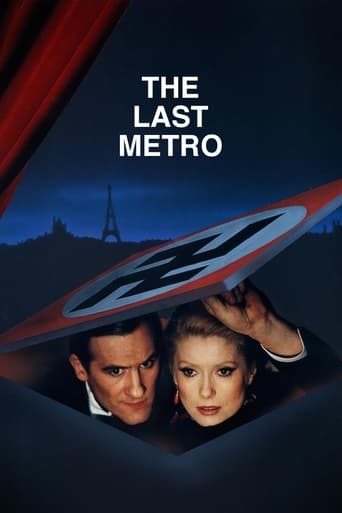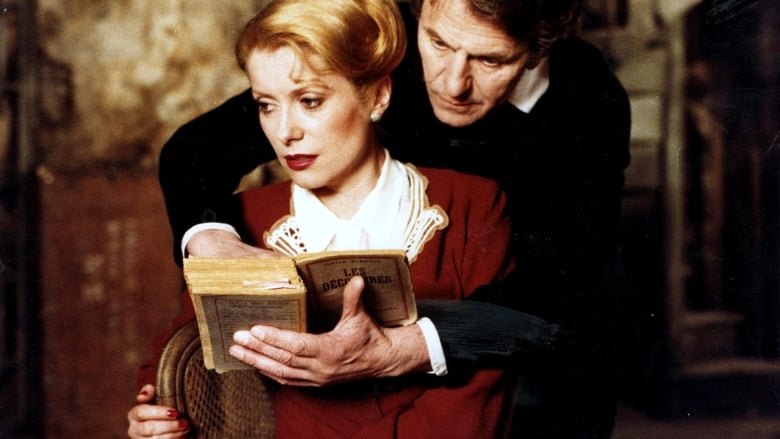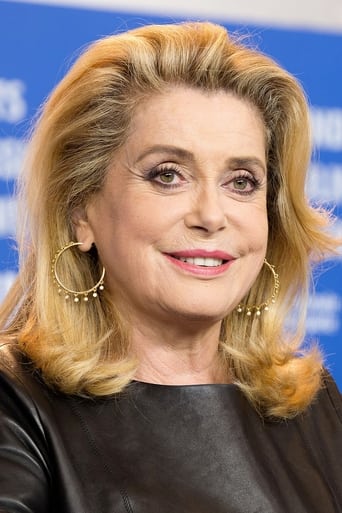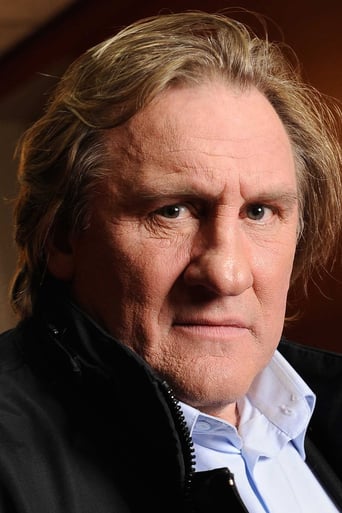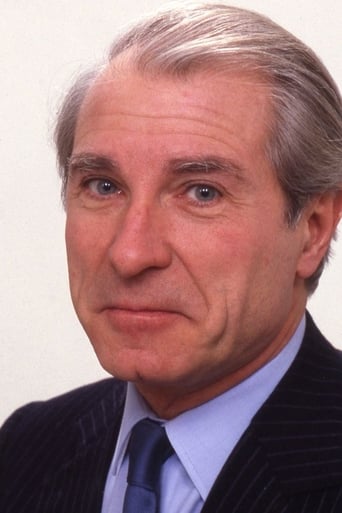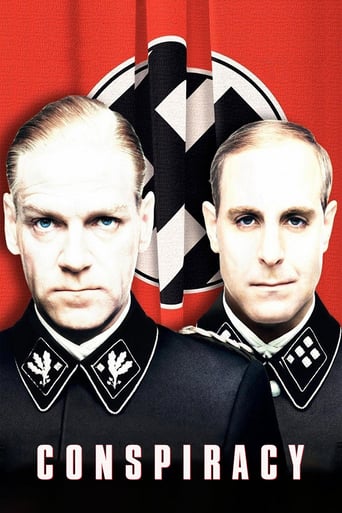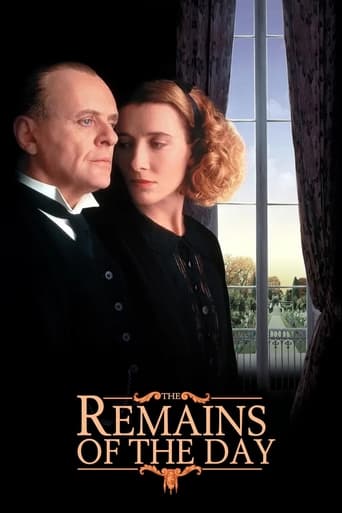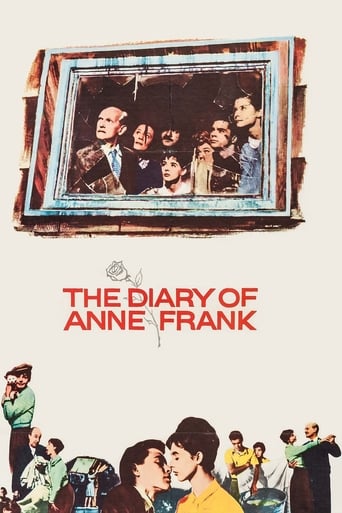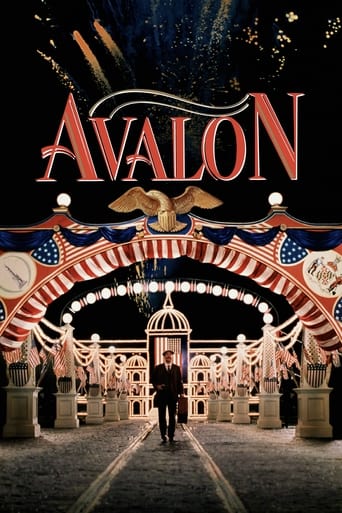The Last Metro (1981)
In occupied Paris, an actress married to a Jewish theater owner must keep him hidden from the Nazis while doing both of their jobs.
Watch Trailer
Cast


Similar titles
Reviews
Why so much hype?
As Good As It Gets
If the ambition is to provide two hours of instantly forgettable, popcorn-munching escapism, it succeeds.
There's no way I can possibly love it entirely but I just think its ridiculously bad, but enjoyable at the same time.
Truffaut's The Last Metro may seem like nothing too stylish, and perhaps compared to his early work it isn't. He takes his time telling this story and building up the characters and how they're all in this situation together circa WW2 in France (perhaps his version of To Be or Not To Be, with less jokes). In general, this film's greatness comes from simply containing wonderful, moving performances. Though I didn't know his work super extensively before this (outside of The Serpent's Egg), Heinz Bennet is the revelation here, to quote the film's own a-hole Nazi critic. But this is not to say that Deneuve isn't also exceptional, mostly in a performance that requires some understatement and listening, which is key for an actor. Especially when her character has to hide something in a conversation. And it all has a fine sense of the period and what 'theater' means.The Last Metro is an example of one of a few films that can be both really hopeful and really dark. And it has one of the most charmingly subversive endings in modern cinema.
"Le dernier métro" was one of Director Francois Truffaut's last works. He only made two more movies afterward before his premature death at the age of 52. Here he got Catherine Deneuve and Gérard Depardieu, which means two of the greatest French actors of all time and one of the greatest directors. Unfortunately it did not turn out as one of the best French movies of all time despite these promising ingredients. The one thing which hurt the film a lot for me was that I did not feel Depardieu and Deneuve had any real chemistry here. I felt much more chemistry between Bennent and Deneuve in fact which is bad as the plot develops completely against their relationship. A minor criticism would be the title. I thought the reference with the last train leaving the station was just too minor to name the whole film after it. In addition, Andréa Ferréol's character did almost nothing for me. She is the reason for Depardieu's character to act so strange early on and her later breakdown due to Deneuve's character becoming more and more difficult to work with just felt unauthentic and randomly thrown in. I don't know what was the purpose behind that or her character in general.The story can be summarized quickly. In World-War-II Paris, occupied by Germans, a group of theater actors work on their newest play. The problem is that the director is Jewish and had to flee. Actually he did not. He lives in the theater's cellar where he is provided with food and information about the political climate by his wife, the lead actress in the play. He finds ways to direct the actors and despite people not knowing he is down there, he manages to make an impact in forming the play while his wife begins to develop feelings for her co-actor.The film was the big winner at the French Film Awards when he came out. It received 10 Césars and only lost the supporting actor/actress categories, but was also nominated there. Consequently, it was France's submission to the Foreign Langue Film category at the Academy Awards that year, where it scored a nomination as well, but lost to the Soviet entry.This is a film really only for those who love French cinema. Then again, others probably won't come across it 35 years after it was made. The common (invalid) criticism that nothing really happens is really the case here. Also it runs considerably over two hours, which means you may become bored if French movies aren't your cup of tea. I liked the Asterix-like introduction (although it certainly was unintended) and the ending where their next play is mixed with reality and I was pretty surprised. Apart from that, the most interesting about this film is the depiction of life in Paris during the German occupation and the many historic references. The music is nice as well. "Bei Mir Bistu Shein" is such a great song.
I kind of expected a "Paris under occupation" drama, but this wasn't it, it's more a mixed bag of goods. There isn't a lot of drama, actually, which makes this movie somewhat slow and tedious to watch.The plot: a celebrated Jewish-German theatre director (Heinz Bennent) fails to escape from occupied France, and has to hide in the cellar of his theatre in Montmartre. From down under, he directs another hit play, while his beautiful wife (Cathérine Deneuve) dotes on him. Nevertheless an affair develops between her and the male lead actor, played by Gérard Depardieu, but none of them seem to take it too serious (they're French, after all, except the German director, who seems to have gone native). There's a plethora of side stories, a French collaborateur movie critic, a Jewish girl and lots of lesbians and gays, but they all kind of amble along instead of leading up to something. It's all very farcical, and you never get the impression that anyone is suffering from the war and the occupation. And the eponymous métro is a no-show -- I don't know why Truffaut put it in the title as it has nothing to do with the movie.We probably all expect the director, Lucas Steiner, to be betrayed and to end up in concentration camp. This doesn't happen which makes the movie somewhat offbeat and optimistic, but also a bit pointless. Let's face it, despite this movie earning 10 Césars along rave professional reviews, it's not one of Truffaut's best. So I'd recommend this one mostly to Truffaut completists.
It is a strange feeling to read that many critics do not consider "Le Dernier Métro" as one of Truffaut's best films.This is absurd as Monsieur Truffaut was a cinéaste who considered all his films as equal.One is not sure as to how some harsh critics have considered this film as one of Truffaut's commercial projects.The truth of the matter is that Truffaut had always wanted to make a film about Nazism as he had experienced this vicious phenomenon as a young boy.It must be made clear that Truffaut did not make "Le Dernier Métro" in order to please critics,well wishers and admirers.As we talk of this film,it must be stated that "Le Dernier Metro" is an equivocal title for a Truffaut film.It is a title which denotes danger,uncertainty and utter chaos.This is because if one misses the last metro train there would be nothing but unpredictable hopelessness.For denizens of Paris during Nazi occupation time there were good chances that the last metro could be missed by many people who stayed out late nights for theatrical performances.Although this is a film about an artistic "ménage à trois",Le Dernier Métro deals with hidden sexualities of its different characters. It also talks of a restrained love affair which is dwarfed due to two lovers' arrogance. German occupation of Paris is shown in a light tone as there are no scenes of atrocities perpetrated by German soldiers. In this film we get an idea of how artists (cinema and theater) behave in a given set up.It also depicts cold critics who are able of destroy not only somebody's career but also an entire theater production house.Among the actors Andréa Ferréol is at her sensual best.Jean Poiret looks sleek too. The best thing about this film is German actor Heinz Bennent's performance as Lucas Steiner,a theater director who is fed up of his isolation.His character is similar to that of Marnie,a role played by Tippi Hedren in Alfred Hitchcock's film "Marnie".

